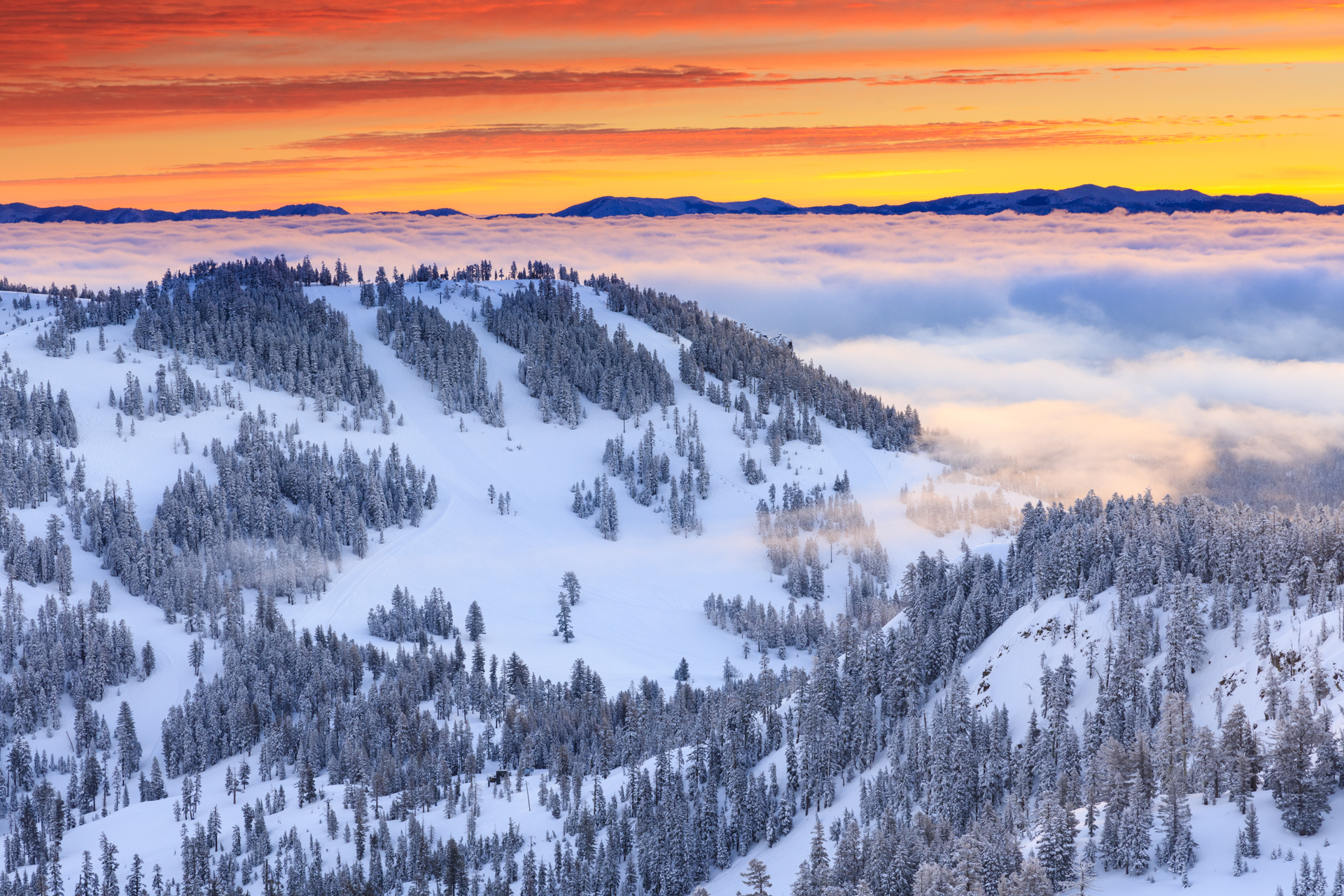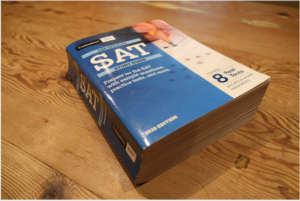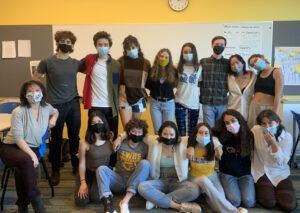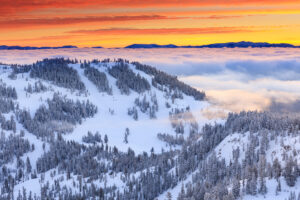
Photo by Grant Kaye
One of the largest ski resorts in the nation recently changed their name from an offensive slur to what they saw as a more welcoming description of the site. “Sq**w Valley Ski Resort” was renamed “Palisades Tahoe” on September 13, after a year of research by the resort and decades of encouragement from Indigenous communities.
Sq**w Valley has been open for more than 70 years. The world famous ski resort hosted the 1960 Winter Olympics and today provides runs for every level of skier and snowboarder on two mountains — Alpine Meadows and Olympic Valley.
The Washoe Tribe of Nevada and California, the Indigenous inhabitants of the land on which Sq**w Valley now sits, first asked the resort to change its name in the 1990s. The resort’s choice to work with the tribe happened a little over a year ago.
The name of Sq**w Valley and the etymology of the word have been highly disputed for years. The origins of the word “sq**w” come from the Algonquian word for “woman,” a neutral term before colonial appropriation. The word quickly became a slur settlers used as they moved westward to dehumanize and sexualize Indigenous women.
In the 2010 article, “The S-Word: Discourse, Stereotypes, and the American Indian Woman,” Debra Merskin writes, “The two most common stereotypes of Indian women are the Indian princess, who conveys natural, wholesome, virginity, and freshness, and the Sq**w, her opposite, the ‘failed’ princess.”
Merriam-Webster now recognizes “sq**w” as a dated, disparaging and offensive word to describe an Indigenous woman of North America. Although the origins of the word may have just been a way to describe someone’s sex, it has become a clearly offensive and hurtful term to degrade Indigenous women.
Eyla Mayer-Snowden is a Northern Cheyenne teenager who lives in the Bay Area. “It isn’t necessarily the word itself. It’s the fact that it’s being used and is continuously being used against Native American women,” she said.
“For me, the term is racist and derogatory. It is meant to belittle somebody or belittle their worth. Historically it has been used to mean prostitution as well as sexual violence against women,” Chauma Jansen, who is affiliated with the Sioux Assiniboine and Navajo tribes, told Palisades Tahoe.
Palisades Tahoe’s website lists many possible origin stories for the resort’s original name. One describes the first colonists who arrived in the valley in 1850, when most of the Washoe men were away on a trek. The colonists were surprised to see only women and children, and named the base camp “Sq**w Valley” after the Indigenous women they encountered.
The website recognizes that the term “sq**w” had “already taken a primarily dehumanizing and derogatory context” by the time the resort was given its original name. During that time, California had laws that encouraged the kidnapping, enslavement and murder of Indigenous peoples.
Words like this were used to paint Indigenous people as less than human in order to justify their genocide.
The word “sq**w” was never used in the Washoe language, however Washoe people today still have to see the slur displayed across their ancestral land. “The word itself is a constant reminder of the unjust treatment of the native people, of the Washoe people,” said Darrel Cruz, the Tribal Historic Preservation and Cultural Resources Officer of the Washoe Tribe.
“Naming and/or re-naming landforms, removing what Indigenous people of an area called a place, is a form of colonization,” according to Merskin. Even the name “Lake Tahoe” was a colonist’s mispronunciation of the Washoe term for the lake, “Da ow.”
“To many Native people, renaming is not just a matter of politeness, it is an effort to reclaim Indigenous identity and decolonize the landscape,” Merskin said.
“Our nation’s lands and waters should be places to celebrate the outdoors and our shared cultural heritage — not to perpetuate the legacies of oppression,” Secretary of the Interior Deb Haaland said.
Haaland, the first Native American to serve as a cabinet secretary, formally declared “sq**w” to be a derogatory term on November 19. She initiated a task force to rename geographic locations that have the term in their names, which includes the roads and other topographical features of Palisades Tahoe’s surrounding area.
The complete removal of the word, “sq**w,” might take multiple seasons because of its appearance in thousands of locations across the resort, but the most prominent signage has already been replaced.
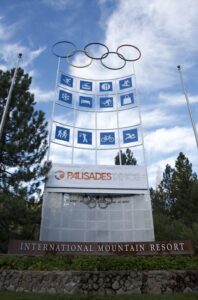
photo courtesy of Palisades Tahoe
Most businesses in the surrounding area changed their names when Palisades Tahoe did. Those that did not, including a hotel called “The Resort at Sq**w Creek,” will likely be renamed by the end of 2022.
“At the end of the day, ‘sq**w’ is a hurtful word, and we are not hurtful people. It was a change that needed to be made for us to continue to hold our heads high as a leader in our industry and community,” Dee Byrne, Palisades Tahoe’s president, stated. “We have a well-earned reputation as a progressive resort at the forefront of ski culture, and progress can’t happen without change.”
Washoe Tribal Chairman Serrell Smokey said in a press release, “We are very pleased with this decision; today is a day that many have worked towards for decades. The Washoe Tribal Council recognizes the significance of the name change and on behalf of the Washoe people expresses its great appreciation for this positive step forward.”
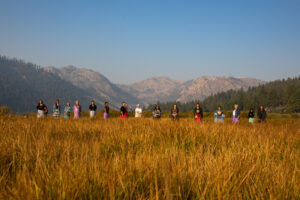
photo by Ryan Salm
Ella English ’23 is a member of Palisades Tahoe’s Mogul Ski Team and has skied many winters on the area’s towering mountains. Before the resort’s name change, she had noticed sports historically misusing Indigenous terms. “I was so open about calling out these football and baseball teams, but the place where I called home was doing the same thing and I didn’t even know it.”
English said she was grateful for the opportunity to be educated. “It makes me think about how there might be other things in my life that are hurting others without my knowledge. So I’m trying to be more aware of what I can do to educate myself and those around me.”
Mitzi (last name undisclosed), a ski shop owner in Tahoe, had a negative reaction to the name change. “Are we offended by it because somebody told us we should be? Or did we really believe that it was offensive?” Mitzi asked. “And again, it’s a mountain and a ski resort. It’s not a human being.”
Mitzi felt as though the resort was calling attention to the inappropriate term performatively. “If you’re really that concerned about what has happened to our Indigenous people, then give the whole damn valley back to them,” she said. “And that’s not going to happen because they have millions and millions of dollars invested in it.”
“Palisade is defined as a line of bold cliffs,” according to Palisades Tahoe’s website. They explained that the name comes from the resort’s unique geography, history and community.
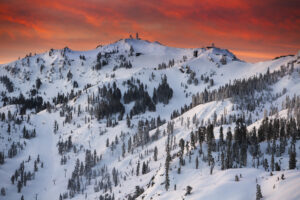
Photo by Grant Kaye
This definition is supported by both Merriam-Webster and Oxford Dictionary, but the word does have another significance. A “palisade,” according to these dictionaries, is also a fence of wooden stakes forming a defense or enclosure.
When Lick-Wilmerding High School English teacher Jennifer Selvin learned this definition, she began explaining the British history of enclosures. Until the Middle Ages, there was common land the town could farm, but through Enclosure Acts, common land was reduced and land became viewed as property.
“Many Native American peoples in this country have ideals around land that are opposite to the idea of private ownership in America today,” Selvin described. “They might see land as a common resource, and the word ‘palisades’ is like a border and a barrier. This (the name change) is all for profit, it’s where capitalism and colonialism intersect.”
“This is a luxury place, it’s always important to look at who gets to use it and who doesn’t,” Selvin said. “The fact that this is an enclosure for rich people strikes me as antithetical to what I would imagine Indigenous beliefs are around commonly held land.”
These palisades were commonly used during the Colonial Era by both Indigenous nations and communities of settlers for protection from each other. For example, surrounding the first American colony of Jamestown was a 14-foot-tall palisade built to keep Native Americans out.
“It’s a bit infuriating, because if you could find that with a simple Google search, it makes me question how much research was actually put into choosing this new name,” English said. “If you already have history with negative Indigenous representation, I would think you would do your best to choose a word that avoided any sort of controversy. And it just seems they didn’t put that level of thought into the new name.”
The name for the resort was likely not meant to honor these types of palisades. Nevertheless, the choice resonates with irony.




